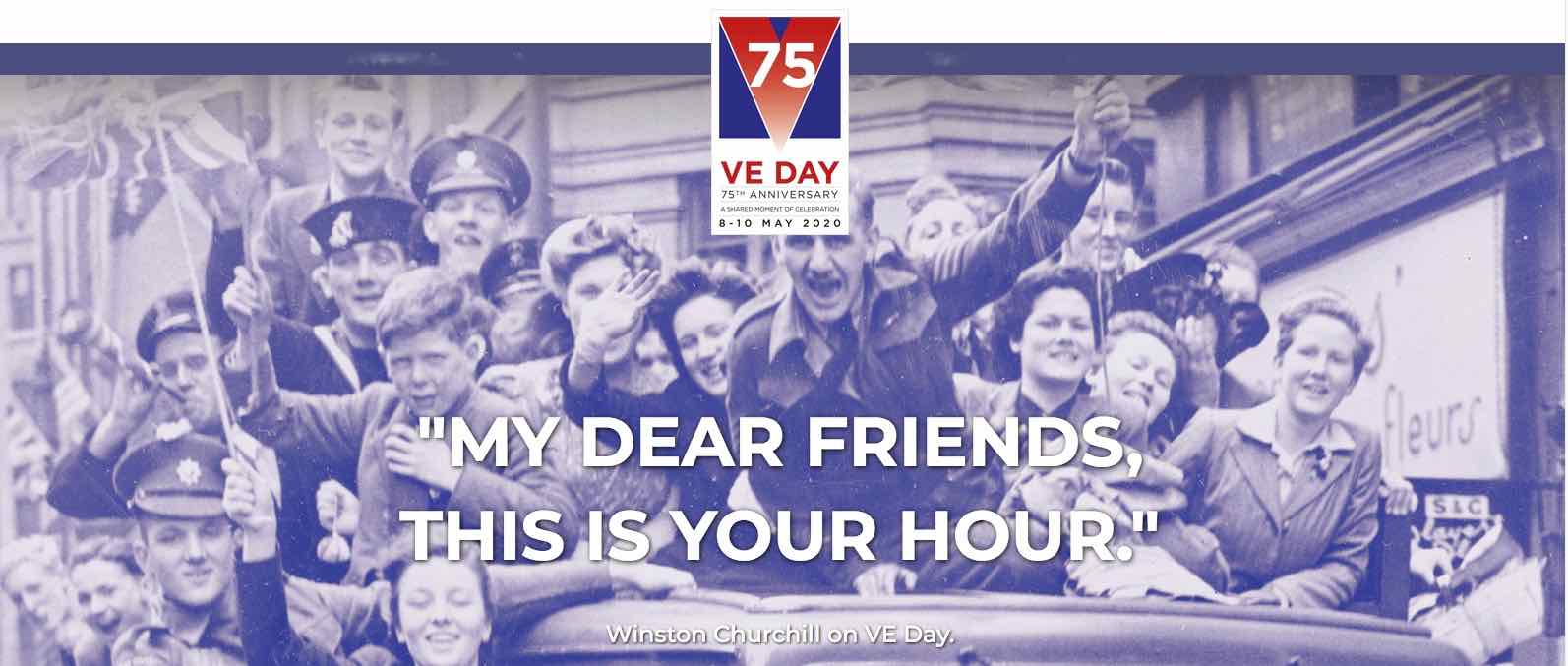annebarone.com
French Chic & Slim
Nouvelles
News and Opinion from Anne Barone to Keep You Chic & Slim — INDEX to Previous Nouvelles
excellent source COVID-19 information: Johns Hopkins Coronavirus Resource Center

image: VE Day 75th Anniversary celebration website image
|| 9 may 2020
VE Day And Its Meaning For Today's Crisis
My afternoon tea reading these past days has been Rick Atkinson’s The Guns at Last Light: The War in Western Europe, 1944-1945 in which the author recounts D-Day 6 June 1944 to the end of the war in Europe with the formal Nazi surrender at Reims, France on 8 May 1945. This is the final volume in his “The Liberation Trilogy” on World War II in Europe. The trilogy’s first volume won a Pulitzer Prize.
As I wrote on the 75th anniversary of D-Day, my father led his men onto the beach in Normandy on D-Day. I was born three weeks later. Victory in Europe came seven weeks before my first birthday. The book I am reading is my father’s story — and the story of hundreds of thousands of other fathers.
For the occasion of the 75th anniversary of VE-Day, the Wall Street Journal published an essay by Rick Atkinson the book’s author. The essay is titled "Still Worth Defending: 75 years ago, the Allies brought the Nazi threat to an end with resolve, endurance, sacrifice and leaders who knew the importance of working together."
Following are pertinent points of Rick Atkinson’s essay.
The jubilation was tempered by exhaustion, sorrow and a stark awareness that World War II hadn’t yet run its course in the Pacific.
No less sobering is the suspicion that the postwar world that began on V-E Day—a Pax Americana of peace, prosperity and fitfully ascendant democratic values—is also sputtering to an end. The current pandemic has exposed grave shortcomings in American leadership and expertise. Deep fissures separate us from our closest allies, and from our fellow Americans. The extraordinary institutions created for global stability after World War II, including NATO and the U.N., seem ever more brittle—in part because of a decline in American willingness to lead with aspirational, albeit imperfect, moral authority.
But Rick Atkinson sees our current situation as all the more reason to draw strength from that day 75 years ago that brought an end to the war in Europe when the Nazi representative signed the official Act of Military Surrender in a room in a redbrick technical college in Reims, in the northeast of France. Rick Atkinson writes:
The Allies won because of material preponderance, Axis mistakes and superior leadership. The cohesion of the Allied coalition brought victory. Crucially, Allied leadership included checks and balances to temper arbitrary willfulness and personal misjudgment.
The author concludes that because of the struggles of the war, the people — including the surviving combatants — as well as their political leaders found the courage for the tremendous work of rebuilding. Prime Minister Churchill of Britain told those who had won the war that they must now go forward “unflinching, unswerving, indomitable till the whole task is done and the whole world safe and clean.”
We have a similar task to rebuild following the devastation of this coronavirus crisis.
be chic, stay slim, rebuild well — Anne Barone